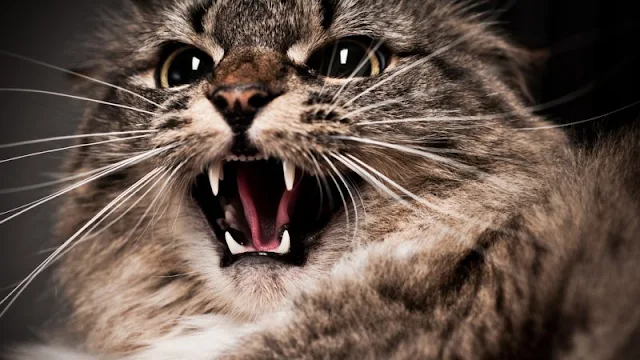why is my cat aggressive with me?
How to stop cat aggression
Cats are generally known for their independent and mysterious nature. They can be loving and affectionate companions, but sometimes they may exhibit aggressive behavior towards their owners. If you've been asking yourself, "Why is my cat aggressive with me?" you're not alone. In this article, we will explore the various reasons behind cat aggression towards humans and discuss effective solutions to curb this behavior.
Aggressive behavior in cats
Understanding feline aggression is essential to address this issue effectively. Aggressive behavior in cats can manifest in different ways, including hissing, biting, scratching, growling, or even pouncing. It is crucial to differentiate between normal play aggression and behavior that stems from fear, territoriality, or underlying medical conditions.
Cat aggression towards humans
If your cat is displaying aggression exclusively towards you, it can be disheartening and confusing. However, it is essential to remember that there are various reasons why this behavior may occur. It could be due to fear, stress, redirected aggression, or even improper socialization during their early development stages. By identifying the root cause, you can address the issue effectively.
Aggressive cat behavior signs
Recognizing the signs of aggression in cats is the first step towards finding a solution. Here are some common indicators of aggressive behavior:
- Growling or hissing
- Swatting or scratching
- Biting or nipping
- Unpredictable and sudden attacks
- Tail twitching or lashing
- Puffed-up fur and arched back
If you notice any of these signs, it's crucial to address the issue promptly.
Cat aggression causes
To address your cat's aggressive behavior, it's essential to identify the underlying causes. Here are some possible reasons why your cat may be aggressive towards you:
Territorial aggression
Cats are naturally territorial animals, and they can become possessive of their living space. If they perceive you as a threat to their territory, they may display aggression.
Fear aggression
Fear is a common cause of aggression in cats. If they associate certain situations or stimuli with fear or danger, they may react aggressively to protect themselves.
Redirected aggression
Redirected aggression occurs when a cat is unable to reach the source of its frustration and ends up directing its aggression towards an easy target, such as the owner. This type of aggression can be triggered by outdoor cats, wildlife, or even intense play sessions.
Medical issues
Underlying medical conditions can also cause aggressive behavior in cats. Pain, discomfort, or hormonal imbalances may lead to irritability and aggression.
Cat aggression solutions
Now that we have explored the possible causes of cat aggression, let's discuss some effective solutions to help you and your furry friend.
Consulting a veterinarian
If you notice sudden changes in your cat's behavior, it is crucial to rule out any underlying medical conditions by consulting a veterinarian. They can conduct a thorough examination and recommend appropriate treatment if required.
Identifying triggers
Try to identify the specific triggers that lead to your cat's aggression. This could be certain sounds, interactions, or even specific individuals. Once you have identified these triggers, you can take steps to manage or avoid them, gradually reducing your cat's aggressive responses.
Positive reinforcement
Reinforcing positive behaviors through reward-based training can be highly effective in curbing aggression. Whenever your cat displays calm and non-aggressive behavior, reward them with treats, praise, or playtime. This positive association will help them understand that aggression is not necessary to get what they want.
Creating a safe environment
Ensuring a safe and enriched environment for your cat can significantly reduce aggression. Provide them with plenty of toys, scratching posts, and hiding spots to fulfill their natural instincts. Additionally, consider implementing a regular play routine to release any pent-up energy.
Behavior modification techniques
In some cases, professional behavior modification techniques may be necessary to address cat aggression. Working with a qualified animal behaviorist can help you develop a personalized plan to modify your cat's behavior and create a more harmonious relationship.
Cat aggression towards owners
It's important to remember that aggression towards owners is not a reflection of your cat's dislike or hatred towards you. Cats communicate through their behavior, and aggression is their way of expressing their emotions or needs. By addressing their aggression with patience, understanding, and appropriate interventions, you can improve the bond between you and your feline companion.
Curbing cat aggression
Dealing with a cat's aggression can be challenging, but it's not an impossible task. By taking the time to understand the underlying causes and implementing the appropriate solutions, you can effectively curb your cat's aggressive behavior. Remember, consistency, patience, and positive reinforcement are key when addressing any behavior issue in cats.
Conclusion
Cat aggression towards their owners can be distressing, but it's essential to approach the issue with empathy and understanding. By identifying the root causes and implementing appropriate solutions, you can create a safe and harmonious environment for both you and your feline friend. Remember, it takes time and effort, but with the right approach, you can build a stronger bond with your kitty and overcome their aggression.

